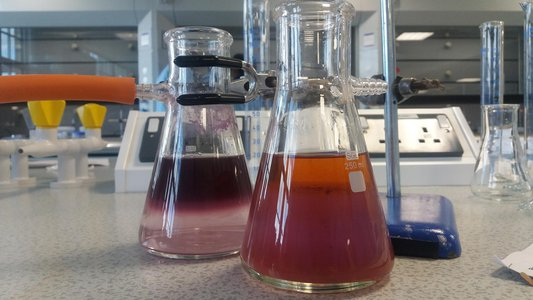

Some Chemistry degrees are offered with a few different titles – some are classed as BSc whilst others are called MSci. What’s the difference?
What does BSc mean?
BSc is the shorthand form of ‘bachelor’s of science’. This is a three-year course. These three years are made up of a combination of modules, some of which are taught and others which are lab based held at the Waterloo campus. The lab modules are essential in becoming a chemist and for the Royal Society of Chemistry degree accreditation.
What is MSci?
If you are like me and looking into a master’s degree, you may have come across various titles such as MChem, MSci, MRes, MS, MPhil. What do these mean and what’s the difference between them? A few pointers are:
- Master’s usually come in two types: taught or research focused. If a postgraduate master’s degree only contains taught modules, then it is usually classed as an MS or MSc which stands for ‘master’s of science’.
- Another common classification is MRes, this is a combination of taught modules and research (the ratio of taught: research varies per course). This would mean that for a set duration of the course you will join a research group where you will be working on your own research project, supervised by a researcher. This allows you to gain some insight into what it is like to be a scientist whilst also furthering your knowledge in a certain area.
- An MPhil is a purely research-based master’s degree.
An MSci or MChem are an undergraduate equivalent to an MRes, which usually contain a mixture of taught module(s) and a research project.
What does ‘undergraduate equivalent’ mean?
Most science postgraduate master’s degrees can be quite expensive thus, the MSci gives students the opportunity to obtain a master’s degree with the perks of an undergraduate. This means that rather than graduating after the standard three years with a BSc, you stay on and complete a 4th year (considered the master’s year) and graduate with an MSci.
If you know that you would like to do a master’s in Chemistry, then I would highly recommend the integrated MSci degree because:
- It can save on costs, and the process is the same through student finance
- The majority of the course is research-based. This gives you great insight and time to carry out cutting edge research
- The academic year is from September – May, so you’re still able to enjoy a summer holiday before working or other career plans (most postgraduate master’s programmes run from September – September)
- You can still gain other benefits of being an undergraduate student such as King’s Living Bursary
- You can conduct research with a range of research groups at King’s without having to go through a tedious application process. This means you get the opportunity to work in other parts of King’s such as St. Thomas’ Hospital, Guy’s Hospital, New Hunt’s House, and Britannia House (where the Department of Chemistry’s research labs are based).
I hope this explanation and thoughts are useful – good luck in your applications!
Read more…
Ruqaiya shares her top 5 tips for studying Chemistry at King’s

Leave a Reply